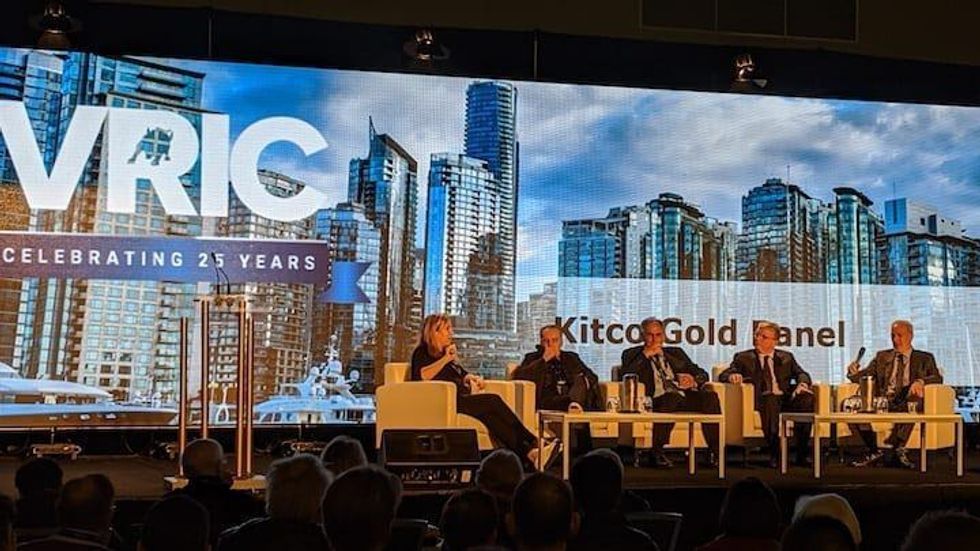Peter Schiff: Gold Could Go Much Higher Depending on US Election
Speaking at a gold panel at VRIC this week, Schiff shared his opinions on what a Sanders or Warren presidency could do to the gold price.
Gold saw highs in 2019 that could be easily eclipsed by highs in 2020, according to Peter Schiff of Euro Pacific Capital.
“Depending on (the 2020 US presidential) election, we could go much higher,” he said at a gold panel in Vancouver on Monday (January 20). “If Bernie Sanders were to be elected president, just imagine what would happen to the price of gold the very night the results came in.”
Schiff was part of a panel talking gold with Rick Rule of Sprott (TSX:SII,OTC Pink:SPOXF), Frank Holmes of US Global Investors (NASDAQ:GROW) and Grant Williams of Vulpes Investment Management.
The panellists’ talk at the Vancouver Resource Investment Conference included topics such as the price of gold and its future trajectory (up), government regulation and its effect on social opinions on capitalism, cryptocurrency, valuation of gold companies, the purchasing of physical gold and thoughts on platinum group metals (PGMs).

On politics, Schiff said that he had opposed the conventional wisdom in 2016 that US President Donald Trump would be bad for the stock market, and he had since been vindicated.
“I always said that that’s nonsense. Why would people think Trump’s going to be bad for stocks? He’s promising to cut taxes, he’s promising to cut regulations — what about that is bad for stocks?”
The situation with the wildcard candidate was much different in 2020, though, he said.
“In the case of Bernie Sanders or Elizabeth Warren, they’re promising massive tax increases, they want to take control of corporate boards, they want to turn the means of production over to the workers, they want to raise taxes significantly, they want to impose new wealth taxes … I can’t think of anything worse for the stock market for that, yet no one’s even worried about the possibility that this might happen.”
The conversation later moved to social discontent with economic disparity around the world, with Schiff touching on a common theme among the talking heads on stage that the Federal Reserve was to blame for economic issues.
He opined, “Because of how unpopular capitalism has become thanks to the (Federal Reserve) and the government, I think that Bernie Sanders can ride that same type of wave of voters’ discontent.
“(Voters are) being told constantly how great everything (would be with Sanders) — just like they were being told when Obama was president.” However, he didn’t believe that everything was truly great under Obama.
“Trump tapped into that vein with ‘Make America great Again’ and how he was going to drain the swamp — and he didn’t do either, and so I think that Bernie Sanders can get a lot of mileage with let’s make America socialist.”
Moving on to disparity between the gold price and the value of gold companies, Rule and Holmes labelled the gold industry as historically proven “destroyers of capital,” but said that was likely to change.
“The disconnect between gold and gold stocks has to do with the historic underperformance of the gold miners in the last decade. In the last decade the gold price went from US$250 to US$1,900 and free cash flow per share on the US index went down,” said Rule. “That takes special skill.”
“You had really, really skilled underperformance,” he continued, “(but) a wonderful thing has happened — it’s happened slowly but markets work — about 70 percent of those management teams were allowed to pursue other employment opportunities.
“If the industry can prove to investors that they’re not going to destroy capital, I think they’ll do extremely well.”
Talking about the value of companies, Rule said that there was a big gap between major and junior gold companies.
“(Juniors are) way, way overcapitalized. There’s probably 2,000 juniors worldwide, of which probably 500 are viable. So the business itself consumes way, way, way too much (general and administrative expenses), and basically only sells hope.
“That doesn’t mean that there aren’t great juniors,” he added, stating that the idea that the junior resources industry is undercapitalized is “fallacious.”
Finally, the panellists were asked for their thoughts on platinum and palladium, and Rule pulled no punches in saying that the sector was far too easily able to be disrupted supply-wise.
“With regards to PGM metals, they come from Russia, a fairly opaque country; South Africa, a wreck; and Zimbabwe, a joke. Eighty percent of the world’s supplies of PGM metals come from places where the supply chain could be threatened.
“Assuming that the economy stays intact, we have real supply issues in the platinum and palladium business having to do particularly with South African production.”
The panel closed with some words of wisdom from Rule, who spoke highly of the advantages Vancouver-based investors had in the current investing environment, which he has said previously is very healthy and full of opportunity.
“Being in Vancouver, you’re in an absolutely perfect place. You’re living in a community that’s got mining. You can talk to the executives first hand; if they won’t return your call, they’re telling you they don’t care about you, so don’t buy their stocks.
“There’s just no excuse for anyone in this audience not making an amazing amount of money in the next five years. Don’t waste this boom: You’re in the right place at the right time.”
Don’t forget to follow us @INN_Resource for real-time updates!
Securities Disclosure: I, Scott Tibballs, hold no direct investment interest in any company mentioned in this article.





